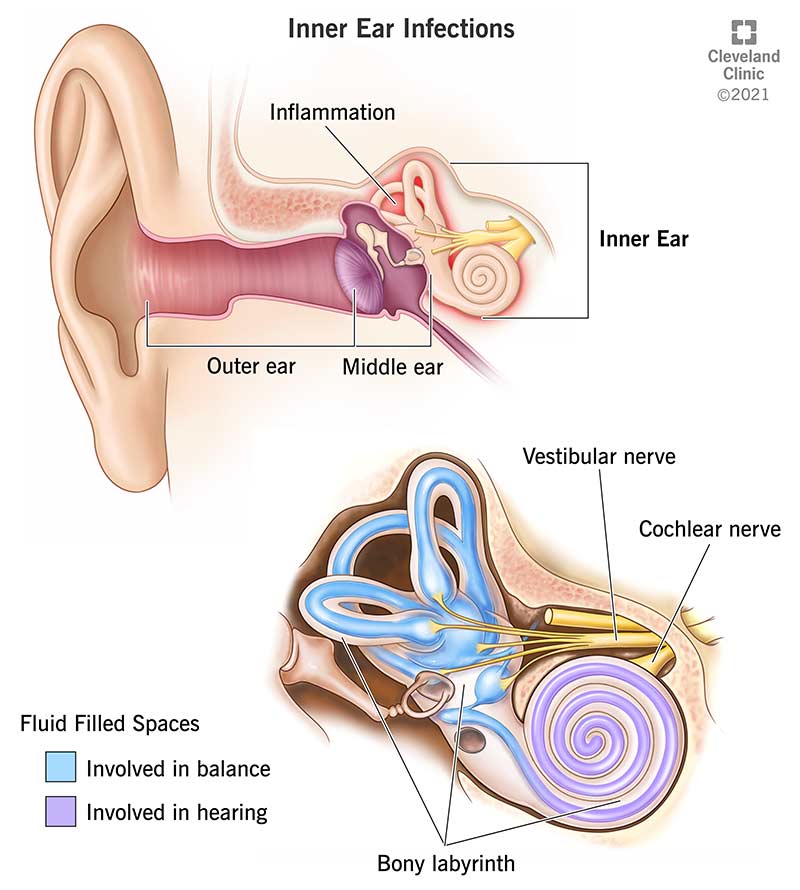An inner ear infection causes parts of your inner ear to become irritated or inflamed. As a result, your hearing and balance can be affected. Inner ear infections can happen if you catch a cold or have the flu. They can also develop when a middle ear infection moves into your inner ear.
Advertisement
Cleveland Clinic is a non-profit academic medical center. Advertising on our site helps support our mission. We do not endorse non-Cleveland Clinic products or services. Policy

Image content: This image is available to view online.
View image online (https://my.clevelandclinic.org/-/scassets/Images/org/health/articles/24240-inner-ear-infections)
The term “inner ear infection” may refer to any condition that causes inflammation in your inner ear. Colds and flu can cause inflammation. Or it can develop when an infection in your middle ear spreads to your inner ear. Many people with inner ear infections experience problems with hearing and balance. The medical term for an inner ear infection is “otitis interna.”
Advertisement
Cleveland Clinic is a non-profit academic medical center. Advertising on our site helps support our mission. We do not endorse non-Cleveland Clinic products or services. Policy
Inner ear infections can occur at any age, but they’re most common in adults aged 30 to 60. Children can also develop inner ear infections as a symptom of bacterial meningitis.
There are two primary types of inner ear infections: labyrinthitis and vestibular neuritis.
Labyrinthitis is an infection of the labyrinth, which is the part of your inner ear that controls hearing and balance. The condition is most commonly caused by viral infections.
Vestibular neuritis is an infection of the vestibular nerve, which is the part of your inner ear that controls balance and eye movement. Vestibular neuritis often develops before or alongside a viral infection.
Your inner ear controls hearing and balance. Therefore, people with inner ear infections may experience a wide range of symptoms associated with those senses. Signs of an inner ear infection may include:
Sometimes, an infection can spread to your inner ear from another area of your body, such as your airway. In these instances, you may also have a runny nose or generalized issues like fever. Oftentimes, your initial symptoms begin fading when your inner ear symptoms begin.
Advertisement
Most inner ear infections are due to a virus, such as influenza, herpes zoster oticus or Epstein-Barr. Less commonly, inner ear infections are the result of bacteria.
An inner ear infection isn’t contagious on its own. But the viruses or bacteria that cause these infections can spread from person to person.
Left untreated, an inner ear infection can damage your vestibular system, which controls balance. In these cases, recovery may last longer. Additionally, an unchecked inner ear infection could lead to permanent partial or total hearing loss. It’s important to see a healthcare provider at the first sign of problems.
A healthcare provider will perform a balance examination, and possibly, a neurological assessment. Unlike other types of ear infections, inner ear infections can’t be properly diagnosed with a visual examination. A comprehensive assessment is necessary to rule out other health conditions, such as stroke, migraine headaches or Meniere’s disease, which all share similar symptoms.
Sometimes, your healthcare provider may prescribe antivirals or antibiotics to treat your inner ear infection. More often, however, they’ll focus on treating your symptoms rather than the infection itself. For example, steroids are often prescribed to ease inflammation.
Additionally, if you’ve developed vertigo or dizziness as a result of your inner ear infection, your provider may recommend antihistamines such as diphenhydramine, fexofenadine or loratadine.
If your symptoms include nausea and vomiting, your provider may prescribe an antiemetic (such as prochlorperazine) or a vestibular suppressant (such as meclizine).
Follow your healthcare provider’s recommendations and take all medications as prescribed. Additionally, you can take over-the-counter pain relievers — such as acetaminophen and ibuprofen — to ease your symptoms. Some research studies also suggest that ginger tea can ease vertigo and nausea.
Inner ear infections can last longer than other types of ear infections. When treated right away, most inner ear infections go away in one to two weeks.
It’s generally safe to return to work, school and other routine activities once your healthcare provider treats you.
You can’t prevent inner ear infections altogether. But there are steps you can take to reduce your risk:
Advertisement
You should schedule a visit with a healthcare provider if symptoms don’t improve within three days or if you develop a fever of 100.4 degrees Fahrenheit, or 38 degrees Celsius, or higher.
Inner ear infections can cause worrisome symptoms such as vertigo, dizziness and balance problems. Most inner ear infections go away within two weeks with proper treatment. Your healthcare provider can confirm your diagnosis, determine an appropriate treatment plan and recommend ways to manage your symptoms.
Advertisement

Sign up for our Health Essentials emails for expert guidance on nutrition, fitness, sleep, skin care and more.
Learn more about the Health Library and our editorial process.
Cleveland Clinic’s health articles are based on evidence-backed information and review by medical professionals to ensure accuracy, reliability and up-to-date clinical standards.
Cleveland Clinic’s health articles are based on evidence-backed information and review by medical professionals to ensure accuracy, reliability and up-to-date clinical standards.
If you have conditions affecting your ears, nose and throat, you want experts you can trust. Cleveland Clinic’s otolaryngology specialists can help.
